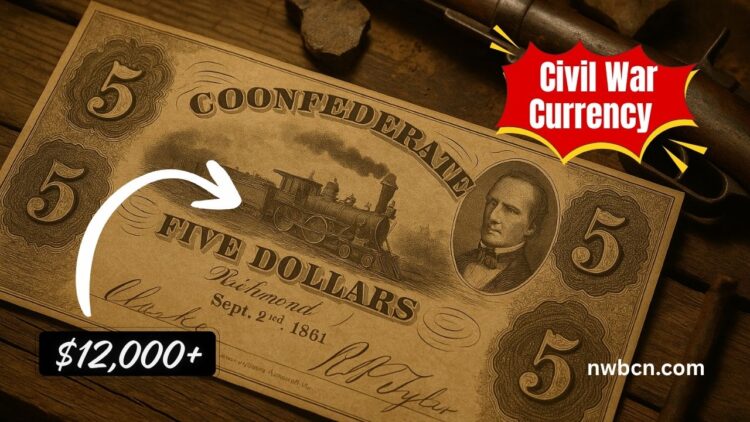In a remarkable Civil War relic discovery, an 1861 Confederate $5 T‑11 note, once hidden in a family treasure chest, was recently authenticated and sold for a staggering $12,000.
Issued August 19, 1861, this T‑11 “Commerce & Sailor” design offers a rare glimpse into Confederate finance and wartime life.
Historical Context: Confederate Currency in 1861
- Issuance Date: August 19, 1861. Among the earliest Confederate States currency issued in Richmond.
- Purpose: Funded the Confederacy’s war effort after the fall of Fort Sumter. These notes were not redeemable in specie but relied on confidence in a hopeful Confederate victory.
- Inflation Impact: As war dragged on and Union victories mounted, later issues lost value, while early notes like this one grew rare and collectible.
Design & Security Features
- Obverse Art: Central vignette of a seated female allegory next to a sailor leaning against a capstan—a powerful image of commerce and maritime strength.
- Reverse: Simple red seal and serial number.
- Specs: Large-size note (~18 × 8 cm), black-brown and red ink on tough paper.
- Security: Early Confederate bills lacked advanced anti-counterfeiting measures, making design intricacy essential.
Rediscovery: From Chest to Auction Block
- Family Find: Kept in a chest since the late 1800s, uncovered by descendants during a 2024 estate review.
- Authentication: Examined and certified genuine by PMG/PCGS experts.
- Auction Performance: Estimated at $5,000–$8,000; final bid reached $12,000, driven by its condition, early date, and provenance.
Value & Survivors of 1861 Confederate $5 Notes
| Issuance Date | Note Type | Survival Estimate | Avg. VF–XF Price | High‑Grade Price (AU–UNC) |
|---|---|---|---|---|
| Aug 19, 1861 | T‑11 $5 | Few hundred | $1,000–$2,500 | $5,000–$15,000+ |
| Sep 2, 1861 | T‑36 $5 | Several hundred | $500–$1,200 | $1,500–$5,000+ |
- T‑11 note value range:
- VG–F: $1,000–$2,500
- AU–UNC: $5,000–$15,000+
- Premium pricing driven by early-issue rarity and collectible demand.
Why This Note Is So Valuable
- Early-Issue Status: Pre-September release means fewer printed and circulated.
- Provenance Matters: Multi-generation family ownership enhances authenticity.
- Good Condition: Crisp details and minimal wear for a 163-year-old artifact.
- Desirable Design: The “Commerce & Sailor” imagery is iconic and favored in catalogs and auctions.
Market Trends & Auction Observations
- GreatCollections records hundreds of similar Confederate notes sold for up to $7,000, but early T‑11 variants exceed typical sales.
- Heritage Auctions notes that early Confederate issues sell at 2–5× later series’ pricing.
- Collector interest in Civil War currency is growing—fine and uncirculated Confederate bills regularly command strong auction performances.
How to Authenticate a Civil War $5 Note
- Certification: Grading by PMG or PCGS verifies age, condition, and authenticity.
- Provenance Documentation: Family letters or ownership records boost value.
- Condition Criteria: Careful attention to folds, stains, and fragility.
- Reference Comparison: Use catalogs like Charlton or Whitman for plate matches.
- Red Flags: Beware of counterfeits; acid-free paper and archival ink age differently than modern prints.
Collector Grades & Values
| Grade | Description | Estimated Value |
|---|---|---|
| VG–F | Moderate wear, visible design | $1,000–$2,500 |
| EF | Light handling, sharp imagery | $2,500–$5,000 |
| AU | Slight wear, almost UNC condition | $5,000–$10,000 |
| UNC | Crisp, uncirculated | $10,000–$15,000+ |
| Certified PMG/PCGS | Expert graded, archival holder | $12,000+ depends on grade |
Collector Tips
- Seek early-dated serials: August 1861 notes are more valuable than later ones.
- Request certification before purchase—grading adds trust and market value.
- Best storage: Archival sleeves, stable climate, UV protection.
- Historical context: Understanding Civil War finances enhances appreciation and demand.
The rediscovery of this 1861 T‑11 $5 Confederate note in a family chest—and its subsequent $12,000 sale—highlights the enduring appeal of Civil War currency.
Its early issue, strong condition, and verifiable provenance make it a standout example of financial history. For collectors, it is more than paper—it’s a preserved chapter of national legacy.
FAQs
Q1: Why is the T‑11 $5 note rarer than later Confederate issues?
Because being issued in August 1861, fewer were printed and survived early war turmoil.
Q2: Is Confederate money still legal tender?
No. Valued today only as historical artifacts and collectibles.
Q3: How do I verify authenticity?
Obtain expert grading from PMG or PCGS, and examine family records or provenance documents.
